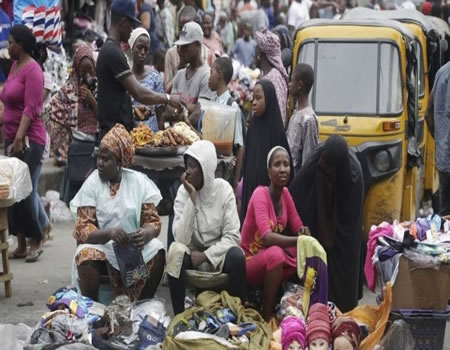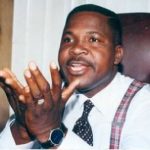AN array of economic experts speaking with Nigerian Tribune separately on Wednesday were unanimous in agreeing that the economy has indeed exited recession citing naira appreciation, moderating inflation and increased economic output.
World Economics, a firm of global economic analysts based in London on Tuesday declared that the Nigerian economy has already exited recession and economy is growing strongly.
It however, warned that there are still issues the economy handlers need to fix before it can be out of the woods.
The organisation said “panelists have explained that although conditions remain difficult for businesses, they are adapting to the challenges and the recent changes to the Naira’s FX rate are aiding sales transactions.
“Overall, conditions in Nigeria have improved further over the past month and managers are expressing renewed optimism that the economy will continue to grow and regain strength after the recession.”
Former Deputy Governor of Central Bank of Nigeria (CBN), Dr. Obadiah Mailafia said “we are gradually going out of recession.
“If you look at just the quantitative figures, the forecast is that at about the end of this year, growth might reach about 1.8 percent or so. This is not bad at all considering that last year ended at -0.8.”
In terms of human development and output however, the economist said “we still have serious challenges. We have challenges with power and energy.”
Mailafia noted that naira value appreciation has helped in moderating inflation, which in turn resulted in Nigerians being able to afford goods and services.
“But I am opposed to the policy of dollarization where the mentality of the people and of the business community is slavishly dependent on the dollar.
“An economy the size of Nigeria with almost 200 million people, an economy that can easily reach $1 trillion in less than a decade and you are dependent on somebody’s foreign money? It is a shame. We need to make the naira stronger.
“We need to give the naira the dignity that it deserves. Why can’t the naira become international convertible currency?
He urged government to intensify efforts at job creation saying “we need to focus on mass infrastructure- railway, highways and so on. And we should do it in a way that it will employ a lot of young people. That will boost aggregate demand.”
Economics professor at Bayero University, Kano, Prof Sani Badayi while speaking with one of our correspondents noted that World Economics based their assertion on facts, which they gathered from the National Bureau of Statistics (NBS).
“It is based on the fact that GDP negative growth recorded since the second quarter of 2016 has now ceased to be negative.
“It means output in the economy has improved. When we say negative it means there is a decline in the rate of growth in the economy as measured by GDP and GNP. It is a primary measure of the performance of the economy.
“Major economic indices include inflation rate, unemployment rate, capacity utilisation by manufacturers and output growth of the agricultural sector. Inflation rate has flattened mainly because of the improvement in value of naira and this gave incentive for capacity utilisation and expansion.
Badayi cautioned that there is still a lot to do to stop negative growth rate and described launch of Economic Recovery and Growth Plan as a step in the right direction.
“When you exit recession, it means you are no longer recording negative growth but the growth process is still very low compare to what is expected to boost development and if there are no efforts in terms of good policies, then the economy may return to recessionary status. Fortunately, both fiscal and monetary authorities are aware of this.
“Again, impact of the improvement in the global economy reverberated on Nigeria.
In his own response, founder, Centre for Values in Leadership Prof. Pat Utomi described the deceleration of the pace of negative growth in the last quarter as a welcome development.
He however, calls for focus on education, health and infrastructure which would translate into real human development.
According to him, Nigerians should not to be obsessed about whether the nation is still in or out of recession but rather interrogate whether the
economy stimulates quality of life, employment, entrepreneurship and eradicates inequalities.
He warned the federal government to be wary of obsession to borrow just to stimulate the economy.
“I think that the process of reversal was already on by the last quarter. I tried to encourage people not to be obsessed with these technical measures and words like recession or lack of it.
Recession means that the growth rate of the economy is negative quarter on quarter. That is a useful measure to realise that there is fire on the mountain. But the real bottom line must be the measure of how to get up the quality of life of the citizens. Recently, the Human Development Index described Nigeria as being among the most miserable place to live on earth. That is what we should focus on as a people.”
“Focus should be more on the social sectors, like education and healthcare, because these are critical to overcoming other things. In addition, we need to continue to stimulate economic activities but we have to be careful about borrowing to spend just to stimulate. We should be a lot more creative about searching and bringing in for private capital to help grow infrastructure.”
“At the same time, we need to push very stoutly initiatives that make entrepreneurs out of our young people. And we need to encourage them to create value without the resources ordinarily required to create such value, not when everything is given to you.
“When we use certain kinds of measure and inequalities are so vast, you will see inequalities like output go up whereas few people have been employed, and little jobs are being provided. It means that the quality of life of the many unemployed continues to be much poorer but at an aggregate level, there has been more output.
We are only just getting things moving to an explosion point. Essentially the economy has to be one in which the measure of performance is the number of people who are working and not receiving handouts but creating value. Those human development indicators are more important to me than aggregate output levels,” Utomi said.
For Dr. Ayo Teriba “we would have to wait for the GDP results to be released before we can make a categorical statement on this.
“It’s like we’ve done an examination and we have to wait for the results for us to know whether we’ve passed or not.
“Throughout all the quarters of last year, the GDPs were negative. But I think we are beginning to see some positives, especially in the area of oil pricing and increase in the quantity of oil being produced now.
“You know what we are experiencing in the economy is a cyclical downturn, induced by a decline in oil prices and a dip in our external reserves.
“We also began to experience problems with our forex which was no longer enough for business. But all these are cyclical. It is a cyclical downturn and if it is cyclical, it has a way of reversing itself, just as we are seeing it now, even without government intervention.
“What we are seeing now is a cyclical downturn given way to upturn. It is happening now not because the government had started implementing its economic recovery programme, but because the situation is reversing itself.
“But if the indices we are seeing at the beginning of the year continue, we are likely to be out of recession very soon,” he stated.
Chief Executive Officer, Financial Derivatives Limited, Bismarck Rewani said “We expected this to happen and our projection was fourth quarter.
“We come out of this primarily before of two reasons- improvement in power sector; improvement in forex environment; increase revenue as a result of borrowing.
“The recovery has started already, it is just for the government to work to make sure it is sustainable”, he said.
According to him, “the recovery has started already, it is just for the government to work to make sure it is sustainable”, he said.
Officials of the World Bank and the International Monetary Fund (IMF) also agreed from Washington that Nigeria might be out of recession.
While responding to a question at the ongoing World Bank/IMF Spring Meetings in Washington on Wednesday, Catherine Pattillo, a Senior Economist at the IMF’s African Department, said “Nigeria went into recession last year, there have been forecasted recovery, but still very fragile so the need to address the fiscal situation is urgent. Our recommendation is for the continued fiscal consolidation.”
Similarly, the World Bank, in a press statement, noted that economic growth in Nigeria is rebounding in 2017 after registering the worst decline in more than two decades in 2016.
The World Bank said, “Nigeria is seeing a rebound from the sharp slowdown in 2016, but the recovery has been slow due to insufficient adjustment to low commodity prices and policy uncertainty.”
The bank, however, noted that recovery remains weak, “with growth expected to rise only slightly above population growth, a pace that hampers efforts to boost employment and reduce poverty.”
Former Nigeria Head of State, General Yakubu Gowon, on Wednesday described the economic report as a good omen and development saying there is light at the end of the tunnel.
Gowon who stated this while leading members of the Bible Society of Nigeria on a courtesy visit to the state governor, Mr. Rotimi Akeredolu , said most Nigerians were excited about the said report, but called on Nigerians to continue to work and pray for the unity of the country.
He expressed optimism that Nigeria would soon be ranked among the best countries of the world if the federal government continues to introduce positive policies that will turn the country around.
He said “The country still moves on despite all the challenges facing the country, you need to accept the situation as it is once the government and the people are determined to bring change for the better.
“Interestingly enough, I read in one of the newspapers that the economic board has removed Nigeria from the recession table. Is that not an encouraging thing?
“Few months ago, we were crying about recession and even our stomach had gone flat as a result of that but from what I have seen, our stomachs will soon begin to protrude.
“Don’t be afraid of any difficulty. If you have trust in God and love for your country and you are determined to put things right, all will be well.”
But, a man in the street, Mohammed M. Kayode, a staff of a federal parastatal in Ilorin, said “I don’t think we can say we are out of recession. Without sounding alarming, we were already in depression and not even recession. Economists can say it better. It’s like we are just out of depression and now experiencing recession. There are still lots to be done to put the nation’s economy in right shape. It was not like this. Things were not as bad.”
Another Nigerian, Femi Gbadebo said, “nothing has really changed. Those in forex trade, may be importers are in good position to tell us with their dealings and interaction in banks. I’m not selling dollars. Those in business will know better. As an ordinary Nigerian I can’t see anything. We are still buying what we are buying in the local market here at exorbitant prices. As an Ordinary man in the street nothing has changed. Eg kerosene, garri, other items. If we are out of recession, prices of garri, etc should go back to what they used to be before recession. Transportation fare is still on the high side. So, I don’t believe or see any factor to say we are out of recession.
Talking about this recent news, the economic assessment carried out was only limited to a class of Nigerians and not reflective of situations with ordinary Nigerians. Even when report of National Bureau of statistics is out on this recession report, will it be a correct representation of the situation among the masses? I don’t know.”
WATCH TOP VIDEOS FROM NIGERIAN TRIBUNE TV
- Let’s Talk About SELF-AWARENESS
- Is Your Confidence Mistaken for Pride? Let’s talk about it
- Is Etiquette About Perfection…Or Just Not Being Rude?
- Top Psychologist Reveal 3 Signs You’re Struggling With Imposter Syndrome
- Do You Pick Up Work-Related Calls at Midnight or Never? Let’s Talk About Boundaries







